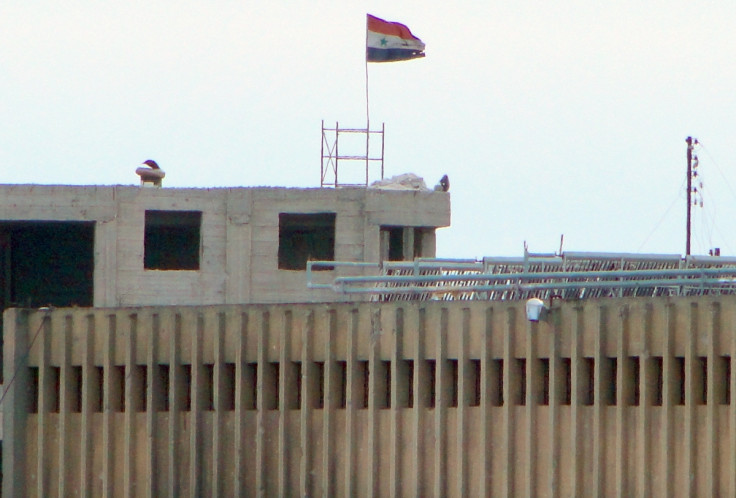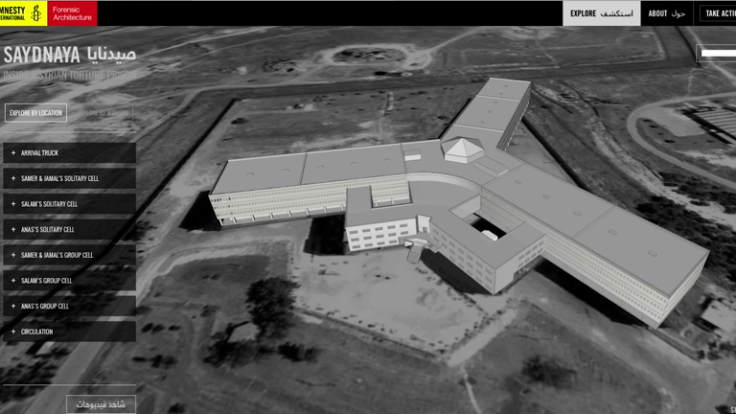Murder, rape and violence in Assad's prisons - this is why refugees leave Syria
Amnesty claims that once or twice a week between 20 and 50 people are hanged at Sednaya.

The brutality of the war in Syria is known: its cadences well-established. Regime barrel bombs and chemical weapon attacks, Russian air strikes, and the many outrages committed by the Islamic State (Isis/Daesh) – all of these combine together in the mind.
This cruelty occurs in the open. But worse – if that were possible – is that which is hidden away in regime prisons, locked away with the prisoners. Occasionally, news escapes the confines of these places of suffering.
We have built up a fairly good picture of what happens there. But every time more information comes to light and a new aspect of this depravity is exposed, there is still a sharp intake of breath, a moment of shock.
A new report from Amnesty International looks at one location in particular, the notorious Sednaya Prison, and concludes that terrible crimes have been committed there.
Detainees are horrifically tortured, their sufferings magnified by both random cruelty and careful intention; and then, possibly after a perfunctory trial, they are killed. Prisoners are killed in their hundreds. Amnesty estimates that "between 5,000 and 13,000" people were executed there between September 2011 and December 2015.
Since then many more are thought to have been killed. This is a systematic process, one which has become almost mundane, savagely routine. "[O]nce or twice a week," the report says, "between 20 and 50 people are hanged to death" at Sednaya.
This amounts to extermination. These are the horrors inflicted upon those who oppose the regime: mass imprisonment, show trials or no trials, followed by torture and, after that, execution en masse.
This form of brutality is essential to dictatorships all around the world, particularly in the Middle East. No doubt they think it necessary to maintain their hold on power. But it has become more than that: as a state-sanctified means of disposing with political enemies, this brutality represents both a ritual and an institution, perversely sacred and thoroughly profane.
Millions of them are holed up in the surrounding countries. Lebanon and Turkey are greatly overstretched.
It looked as though things might change after 2011, when much of the Arab world and the wider world thrilled to see the appetite so many had for democracy, for freedom from fear. But the Mukhabarat state is tenacious; it has hung on. And in so doing it has made use of its mainstay: organised violence, cultivated cruelty.
Despots are threatened by the new democratic movements of the past half-decade, and now authoritarian leaders resort to violence earlier and more decisively. And this violence, when it is unleashed, cannot be controlled. It seeps out into society at large.
In Syria, in particular, the regime's deliberate use of ultra-violence has created a climate in which other groups, notably IS but also Al-Qaeda affiliates and the pro-regime coalition of Russia, Iran and proxies, can make use of the same tactics.
This normalisation of violence and the crushing of all dissent is enough justification to fight back. And when the population takes up arms against a tyrant, things can never de-escalate. Many had already begun to leave Syria to avoid being caught up in the increasing brutality of its war.
They were soon joined by others. That fight against the regime is not going well. Thus opponents of the regime, as well as any fearful for their lives in such a country, make the rational decision to leave.

This is why they flee. They go wherever they can. Millions of them are holed up in the surrounding countries. Lebanon and Turkey are greatly overstretched.
All of this justifies fleeing to Europe. It justifies attempting monumentally dangerous journeys across the Mediterranean and embarking on hazardous routes across land. It makes even the fear of an uncertain arrival on a newly hostile continent seem small.
The debate on Syrian refugees, especially in Britain, has veered from the most high-minded discussion to the crudest dog-whistling. Some politicians fell over each other to declare refugees welcome; others cheerfully pose in front of billboards which employ lines of refugees as vulgar shorthand to make crude political points.
British people are at once welcoming and hostile, generous and profoundly parsimonious. The press coverage is similarly split. Images of suffering stir us; often the stories of this suffering – repeated thousands of times – fail to have the same effect. The public support for taking in more refugees, which seemed to build in 2015, after a particularly tragic summer on the Mediterranean, has now almost entirely dissipated.
But our collective reserve of compassion has run low: now refugees are not seen as people to help, they are seen as a problem in need of a solution.
And what a problem it is. The violence in Syria shows no signs of abating. The regime and its Russian backers have recently flattened Aleppo (formerly a teeming metropolis) and forcibly deported its population. The regime coalition will not decrease the violence of its war. No longer imperilled, it is possessed of a new delusion – that it could conquer the rest of the country – and in pursuit of this unrealistic goal it will happily, as its propaganda will attest, "burn the country" to the ground.
There is also the problem of what to do with the Islamic State. Though the expansion of IS appears to have been arrested, the recapturing of the territory it holds will be a drawn-out, painful process. This will generate more refugees. The reconquest of Raqqa, its de facto Syrian capital, is still a while away. But don't expect that to go entirely smoothly or be surgical.
The refugees keep coming and, looking at the state of Syria today and the nature of its government, who can blame them? The Assad regime is beyond redemption and reform. While it remains, the refugee crisis can only continue, and intensify. Until such a day as Syria is at peace, we must prepare to see more refugees, and must therefore understand the necessity of taking our fair share in order to lessen the impact of this historic crisis.
James Snell is a British journalist who has written for many international publications. Follow him on Twitter: @James_P_Snell.
© Copyright IBTimes 2025. All rights reserved.






















